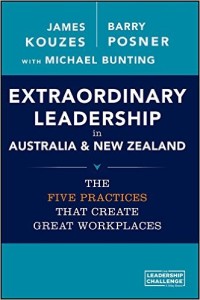Extraordinary Leadership in Australia and New Zealand
15 Nov
 Leadership is for everyone. Leadership is taking responsibility and make a difference.
Leadership is for everyone. Leadership is taking responsibility and make a difference.
Leadership engage people and brings out the best in them.
5 Practices of Exemplary Leadership:
Model the Way:
Clarify and share values. What you stand for? What you stand against?
Clarify your personal values and formulate a leadership philosophy.
Credibility is the foundation of leadership.
Inspire a Shared Vision:
Imaging exciting and ennobling possibilities.
People crave being part of something exciting and inspiring. Articulate a common purpose.
Challenge the Process:
Look for innovative ways to improve, experiment and take risks.
Generate small wins and learn from experience.
Willing to take risk. Never waste a failure by not learning from it.
Praise for taking initiative.
Enable Others to Act:
Foster collaboration by building trust and facilitating relationships.
Strengthen others by increasing self-determination and developing competence. Empower others.
Value, respect, and understand talents. Create high-trust climate.
Leadership is about relationships. Communicating with clear expectations and guidance.
Take quality time to coach, mentor and uplift people.
Encourage the Heart:
Recognize contributions by showing appreciation for individual excellence.
Celebrate the values and victories by creating spirit of community. Celebrate along the journey.
Refuel and energize. Create a sense of community.









